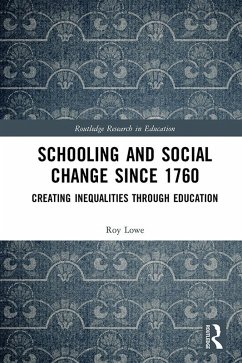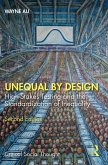40,95 €
40,95 €
inkl. MwSt.
Sofort per Download lieferbar

20 °P sammeln
40,95 €
Als Download kaufen

40,95 €
inkl. MwSt.
Sofort per Download lieferbar

20 °P sammeln
Jetzt verschenken
Alle Infos zum eBook verschenken
40,95 €
inkl. MwSt.
Sofort per Download lieferbar
Alle Infos zum eBook verschenken

20 °P sammeln
- Format: PDF
- Merkliste
- Auf die Merkliste
- Bewerten Bewerten
- Teilen
- Produkt teilen
- Produkterinnerung
- Produkterinnerung

Bitte loggen Sie sich zunächst in Ihr Kundenkonto ein oder registrieren Sie sich bei
bücher.de, um das eBook-Abo tolino select nutzen zu können.
Hier können Sie sich einloggen
Hier können Sie sich einloggen
Sie sind bereits eingeloggt. Klicken Sie auf 2. tolino select Abo, um fortzufahren.

Bitte loggen Sie sich zunächst in Ihr Kundenkonto ein oder registrieren Sie sich bei bücher.de, um das eBook-Abo tolino select nutzen zu können.
Schooling and Social Change in England since 1760 offers a powerful critique of the situation of British education system today and shows the historical processes which have helped generate the crisis confronting policymakers and practitioners at the present time.
- Geräte: PC
- mit Kopierschutz
- eBook Hilfe
Andere Kunden interessierten sich auch für
![Schooling and Social Change 1964-1990 (eBook, PDF) Schooling and Social Change 1964-1990 (eBook, PDF)]() Roy LoweSchooling and Social Change 1964-1990 (eBook, PDF)51,95 €
Roy LoweSchooling and Social Change 1964-1990 (eBook, PDF)51,95 €![Education and Climate Change (eBook, PDF) Education and Climate Change (eBook, PDF)]() Education and Climate Change (eBook, PDF)54,95 €
Education and Climate Change (eBook, PDF)54,95 €![Critical Pedagogy and Social Change (eBook, PDF) Critical Pedagogy and Social Change (eBook, PDF)]() Seehwa ChoCritical Pedagogy and Social Change (eBook, PDF)51,95 €
Seehwa ChoCritical Pedagogy and Social Change (eBook, PDF)51,95 €![Unequal By Design (eBook, PDF) Unequal By Design (eBook, PDF)]() Wayne AuUnequal By Design (eBook, PDF)40,95 €
Wayne AuUnequal By Design (eBook, PDF)40,95 €![Education Reform and Social Change (eBook, PDF) Education Reform and Social Change (eBook, PDF)]() Education Reform and Social Change (eBook, PDF)49,95 €
Education Reform and Social Change (eBook, PDF)49,95 €![Radical Educators Rearticulating Education and Social Change (eBook, PDF) Radical Educators Rearticulating Education and Social Change (eBook, PDF)]() Radical Educators Rearticulating Education and Social Change (eBook, PDF)40,95 €
Radical Educators Rearticulating Education and Social Change (eBook, PDF)40,95 €![Using Critical Research for Educational and Social Change (eBook, PDF) Using Critical Research for Educational and Social Change (eBook, PDF)]() Using Critical Research for Educational and Social Change (eBook, PDF)33,95 €
Using Critical Research for Educational and Social Change (eBook, PDF)33,95 €-
-
-
Schooling and Social Change in England since 1760 offers a powerful critique of the situation of British education system today and shows the historical processes which have helped generate the crisis confronting policymakers and practitioners at the present time.
Dieser Download kann aus rechtlichen Gründen nur mit Rechnungsadresse in A, B, BG, CY, CZ, D, DK, EW, E, FIN, F, GR, HR, H, IRL, I, LT, L, LR, M, NL, PL, P, R, S, SLO, SK ausgeliefert werden.
Produktdetails
- Produktdetails
- Verlag: Taylor & Francis eBooks
- Seitenzahl: 206
- Erscheinungstermin: 21. Februar 2021
- Englisch
- ISBN-13: 9781351169554
- Artikelnr.: 60773551
- Verlag: Taylor & Francis eBooks
- Seitenzahl: 206
- Erscheinungstermin: 21. Februar 2021
- Englisch
- ISBN-13: 9781351169554
- Artikelnr.: 60773551
- Herstellerkennzeichnung Die Herstellerinformationen sind derzeit nicht verfügbar.
Roy Lowe is one of Britain's best-known historians of education, having published extensively over a long period on the history of schools and universities. He was for some years President of the UK History of Education Society and was awarded an OBE for services to education in 2002.
Preface
Acknowledgements
Introduction
Education in England: intentions and outcomes
Industrialisation and education
The characteristics of English society
Chapter 1 An age of revolutions: 1760-1830
'The ever-whirling wheel of Change'
Schooling in the Eighteenth Century
A new context for education
Planning for social stratification
Evangelicals and the Sunday school movement
The beginnings of systematisation: the monitorial schools
Socialists, utopians and education
The first stirrings of the State
Embedding inequalities
Chapter 2 The workshop of the world: 1830-1895
'In a progressive country change is constant'
'Governing as little as they could': schooling the poor in Victorian
England
Systematising superiority: the education of a new elite
Creating a new middle class: the reform of the endowed schools
Rebuilding the ivory tower
'Places of moral rather than intellectual training': the schooling of
middle
class girls
Chapter 3 Embedding privilege: the charitable status of elite schools
A neglected issue
Charitable status: the realities
The origins of charitable status
The need for change
Moves towards reform
'A great concession': the establishment of the Charity Commission
The formative years of the Charity Commission
Long-term implications
Chapter 4 Schooling for a changing world: 1895-1914
The Victorian legacy
A new administration for education
Towards a new elementary education
Regulating secondary education
Educating the Edwardian elite
Chapter 5 1914-1939: Schools fit for heroes?
War and its aftermath
Conflicting aspirations
Economising on education
Planning educational futures
Schooling the common people
Gradations of schooling: educating elites between the Wars
Chapter 6 'The safeguard of social stratification': 1939-1979
Schooling during the Second World War
'The search for freedom from want': the post-War years
The primary concern: building a new sector of education
The false dawn of comprehensivisation: secondary schooling, 1945-79
'For all those who are qualified by ability and attainment...and who wish
to
do so': the post-War expansion of higher education
A note of caution
Chapter 7 Neo-Liberalism and multi-nationalism: 1979 to the present
A novel context?
Implementing the new politics of education
The realities of change: the primary sector
The outsourcing of secondary education
The private sector
How higher education was marketized
Conclusion
Schooling and social class
Children as victims
Implications
Acknowledgements
Introduction
Education in England: intentions and outcomes
Industrialisation and education
The characteristics of English society
Chapter 1 An age of revolutions: 1760-1830
'The ever-whirling wheel of Change'
Schooling in the Eighteenth Century
A new context for education
Planning for social stratification
Evangelicals and the Sunday school movement
The beginnings of systematisation: the monitorial schools
Socialists, utopians and education
The first stirrings of the State
Embedding inequalities
Chapter 2 The workshop of the world: 1830-1895
'In a progressive country change is constant'
'Governing as little as they could': schooling the poor in Victorian
England
Systematising superiority: the education of a new elite
Creating a new middle class: the reform of the endowed schools
Rebuilding the ivory tower
'Places of moral rather than intellectual training': the schooling of
middle
class girls
Chapter 3 Embedding privilege: the charitable status of elite schools
A neglected issue
Charitable status: the realities
The origins of charitable status
The need for change
Moves towards reform
'A great concession': the establishment of the Charity Commission
The formative years of the Charity Commission
Long-term implications
Chapter 4 Schooling for a changing world: 1895-1914
The Victorian legacy
A new administration for education
Towards a new elementary education
Regulating secondary education
Educating the Edwardian elite
Chapter 5 1914-1939: Schools fit for heroes?
War and its aftermath
Conflicting aspirations
Economising on education
Planning educational futures
Schooling the common people
Gradations of schooling: educating elites between the Wars
Chapter 6 'The safeguard of social stratification': 1939-1979
Schooling during the Second World War
'The search for freedom from want': the post-War years
The primary concern: building a new sector of education
The false dawn of comprehensivisation: secondary schooling, 1945-79
'For all those who are qualified by ability and attainment...and who wish
to
do so': the post-War expansion of higher education
A note of caution
Chapter 7 Neo-Liberalism and multi-nationalism: 1979 to the present
A novel context?
Implementing the new politics of education
The realities of change: the primary sector
The outsourcing of secondary education
The private sector
How higher education was marketized
Conclusion
Schooling and social class
Children as victims
Implications
Preface
Acknowledgements
Introduction
Education in England: intentions and outcomes
Industrialisation and education
The characteristics of English society
Chapter 1 An age of revolutions: 1760-1830
'The ever-whirling wheel of Change'
Schooling in the Eighteenth Century
A new context for education
Planning for social stratification
Evangelicals and the Sunday school movement
The beginnings of systematisation: the monitorial schools
Socialists, utopians and education
The first stirrings of the State
Embedding inequalities
Chapter 2 The workshop of the world: 1830-1895
'In a progressive country change is constant'
'Governing as little as they could': schooling the poor in Victorian
England
Systematising superiority: the education of a new elite
Creating a new middle class: the reform of the endowed schools
Rebuilding the ivory tower
'Places of moral rather than intellectual training': the schooling of
middle
class girls
Chapter 3 Embedding privilege: the charitable status of elite schools
A neglected issue
Charitable status: the realities
The origins of charitable status
The need for change
Moves towards reform
'A great concession': the establishment of the Charity Commission
The formative years of the Charity Commission
Long-term implications
Chapter 4 Schooling for a changing world: 1895-1914
The Victorian legacy
A new administration for education
Towards a new elementary education
Regulating secondary education
Educating the Edwardian elite
Chapter 5 1914-1939: Schools fit for heroes?
War and its aftermath
Conflicting aspirations
Economising on education
Planning educational futures
Schooling the common people
Gradations of schooling: educating elites between the Wars
Chapter 6 'The safeguard of social stratification': 1939-1979
Schooling during the Second World War
'The search for freedom from want': the post-War years
The primary concern: building a new sector of education
The false dawn of comprehensivisation: secondary schooling, 1945-79
'For all those who are qualified by ability and attainment...and who wish
to
do so': the post-War expansion of higher education
A note of caution
Chapter 7 Neo-Liberalism and multi-nationalism: 1979 to the present
A novel context?
Implementing the new politics of education
The realities of change: the primary sector
The outsourcing of secondary education
The private sector
How higher education was marketized
Conclusion
Schooling and social class
Children as victims
Implications
Acknowledgements
Introduction
Education in England: intentions and outcomes
Industrialisation and education
The characteristics of English society
Chapter 1 An age of revolutions: 1760-1830
'The ever-whirling wheel of Change'
Schooling in the Eighteenth Century
A new context for education
Planning for social stratification
Evangelicals and the Sunday school movement
The beginnings of systematisation: the monitorial schools
Socialists, utopians and education
The first stirrings of the State
Embedding inequalities
Chapter 2 The workshop of the world: 1830-1895
'In a progressive country change is constant'
'Governing as little as they could': schooling the poor in Victorian
England
Systematising superiority: the education of a new elite
Creating a new middle class: the reform of the endowed schools
Rebuilding the ivory tower
'Places of moral rather than intellectual training': the schooling of
middle
class girls
Chapter 3 Embedding privilege: the charitable status of elite schools
A neglected issue
Charitable status: the realities
The origins of charitable status
The need for change
Moves towards reform
'A great concession': the establishment of the Charity Commission
The formative years of the Charity Commission
Long-term implications
Chapter 4 Schooling for a changing world: 1895-1914
The Victorian legacy
A new administration for education
Towards a new elementary education
Regulating secondary education
Educating the Edwardian elite
Chapter 5 1914-1939: Schools fit for heroes?
War and its aftermath
Conflicting aspirations
Economising on education
Planning educational futures
Schooling the common people
Gradations of schooling: educating elites between the Wars
Chapter 6 'The safeguard of social stratification': 1939-1979
Schooling during the Second World War
'The search for freedom from want': the post-War years
The primary concern: building a new sector of education
The false dawn of comprehensivisation: secondary schooling, 1945-79
'For all those who are qualified by ability and attainment...and who wish
to
do so': the post-War expansion of higher education
A note of caution
Chapter 7 Neo-Liberalism and multi-nationalism: 1979 to the present
A novel context?
Implementing the new politics of education
The realities of change: the primary sector
The outsourcing of secondary education
The private sector
How higher education was marketized
Conclusion
Schooling and social class
Children as victims
Implications







